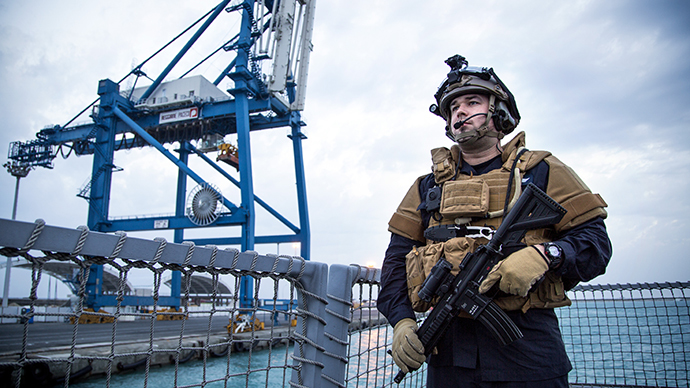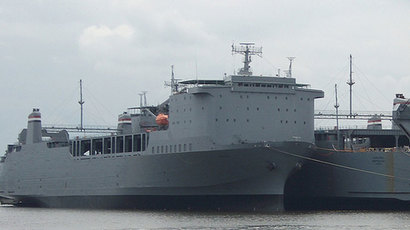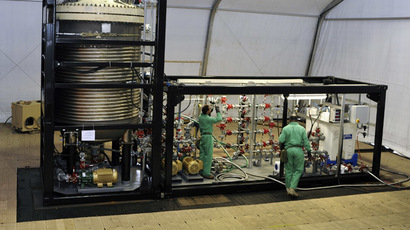Ships return to dock as Syria chemical weapons deadline missed

Norwegian and Danish ships that had been ready to transport Syria's chemical weapons from the country had to return to port in Cyprus, as the deadline for the removal of deadly toxins from Syria has not been met over “war, bad weather and bureaucracy.”
Syria agreed to transport its most hazardous chemicals, including around 20 tons of mustard nerve agent, from the country’s main port of Latakia by December 31. The weapons were planned to be destroyed abroad away from the war zone.
However, the Norwegian frigate and Danish warship which were deployed to transport these weapons, and left Cyprus port of Limassol on Saturday, had to turn back Tuesday as containers with weapons failed to arrive for collection in the Syrian port, Norwegian Defense Ministry spokesman Lars Hovtun said.
“We are still on high alert to go into Syria," Hovtun told the AFP news agency. "We still don't know exactly when the orders will come."
However, the Organization for the Prohibition of Chemical Weapon (OPCW) itself didn’t comment much on the whole situation about the delay, particularly on how much it will last. The international chemical watchdog’s officials remain optimistic toward the weapons removal operation, pointing only to the “delay in customs,” no more.
“OPCW is comfortable in the knowledge that all the work is about to be completed,” said the Special Coordinator of the OPCW-UN Joint Mission, Sigrid Kaag.
According to Kaag, Damascus needs to plan for “any eventuality in the journey from different sites to Latakia and in Latakia itself" as there is “a very complex management exercise over and above the fact that it is a chemical weapons program that has to be destroyed at a time that a country is at war."
Still, OPCW doesn’t lose hope about safely removal of the Syria’s deadly chemical weapons as Kaag sees a “very strong” progress in the operation and there is "a clear determination by all parties to achieve success."
However, the situation in Syria often hampers the efforts to regulate the conflict and to dispose of the hazardous material. On December, 20, a heated battle was underway just meters away from a chemical facility in Syria according to the Russian Foreign Ministry. The Islamist rebels were suspected to have attempted to hamper international efforts to dispose of the deadly weapons.
The chemical watchdog has approved a plan for complete disarmament of the Syrian arsenal. The first part, which now got postponed, most dangerous components, had to have been removed from the country by the end of the year. Other facilities, which were part of production and storage of chemical weapons, will be destroyed by mid-March 2014.
Syria agreed to relinquish its stockpile of chemical weapons by June-2014 amid an international crisis caused by accusations that Damascus had used sarin gas against rebel forces. Syria denied the accusations while Russian authorities called for a proper investigation into the incident.
The long-awaited Syria peace conference, known as “Geneva-2,” is scheduled to begin on January 22 in the Swiss city of Montreux with some 30 nations expected to attend the gathering. The conference is a part of a deal of conflict regulation in Syria which has been discussed by Russia and the US. Earlier Washington threatened to strike Syria, but then in September the disarmament plan was agreed at a meeting between Kerry and Lavrov that the solution to the ongoing Syrian crisis should be found within the framework of the Geneva-2 peace talks and chemical disarmament.














